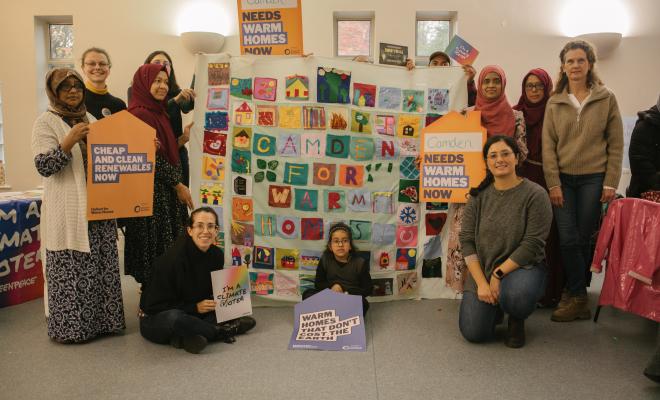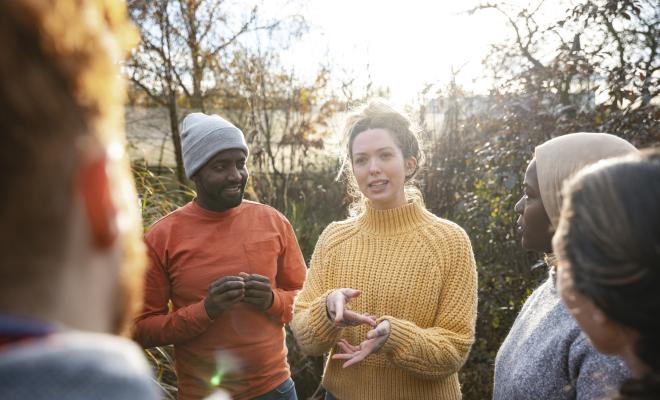05 Oct 2022
Why go local?
Using news outlets that operate in your area can help generate publicity for your campaigns and events, recruit new members and organisations to your cause, and win public favour. A big newspaper splash or TV report can be a powerful way to grab local decision-makers’ attention too.
Local media coverage can also help to build a more complete national picture of an issue, such as the need for warm homes. Widespread coverage makes it easier for journalists to spot trends across the country where communities have shared or similar experiences.
What makes a good story?
The first step is finding an idea that will appeal to journalists. It’s worth remembering that news desks are inundated with emails and press stories, so any idea has to stand out. It could be a campaign launch event, a protest or demonstration, a creative visual stunt or even some interesting research that could make a killer headline.
When brainstorming ideas, it’s important to consider these questions:
- What am I offering that’s new?
- Has this been done before?
- How does this add to the conversation?
- Would I want to read this news story?
- Does it spark debate about issues impacting local people?
Essential press materials
Once you’ve got your idea, it’s time to write a press release notifying journalists about your plans. It needs to be enticing to news outlets and give them enough information to cover your story, but it also needs a good news hook and a snappy headline. Including a quote from your group is always a good idea.
Here are some recent examples from the Friends of the Earth press office to give you a flavour of how to construct a press release. You can also find template press releases for the United for Warm Homes campaign in the resources hub.
Another valuable way to land coverage is by submitting a letter to your newspaper’s letters page. The letters pages remain some of the most read pages in newspapers, and are a great way to ignite debate and get people thinking. Letters must be no longer than 200 words and should be sent by email to the Letters Editor. Use our template letter as a basis for your submission.
Where should I pitch my story?
Find out which local news outlets cover your area. You may already be aware of your local paper or radio station, but there’s probably more on offer than you realise.
- Print publications. For newspapers, there may be hyperlocal titles that serve small areas like villages, as well as much larger titles that cater to your county or even region. Meanwhile, local magazines can be a great way to land interviews and in-depth features.
- Radio. You might have a local BBC radio station in your area, which is a good place to start, but there are also a host of commercial radio stations that run daily news bulletins featuring local stories. Heart, Capital and Smooth are just a few that might operate where you live. Community radio stations are also worth consideration, as many have a dedicated and healthy listenership.
- TV. The BBC and ITV both have a regional network of television stations throughout the country, so find out which programmes cater to your area and make sure to add them to your contacts list. In some areas there are also independent TV stations that provide news locally, for example London Live, or the That’s TV or Local TV brands.
- Online. Digital media consumption consistently outperforms traditional news these days so it’s important to have some digital outlets on your target list. All newspapers will have their own websites but there are now many other news sites that are exclusively online. The good thing about digital news is that it can also be shared widely on social media.
How to get in touch
Most traditional news desks will have a generic email or telephone number on their website that you can use to contact about upcoming stories. Never shy away from picking up the phone – often this is the best way to find out who you should be speaking to, offer up spokespeople or pitch a story quickly.
If you have a certain journalist in mind, check if their email address is listed on their news outlet’s website. If not, it’s worth checking if they have a Twitter profile – many journalists include their email addresses in their bio.
Success: they want to cover your story
You’ve sent out your press release, and good news – they want to cover your story. Perhaps they’ll write an article using what you’ve written, or maybe they’d like to interview you on TV or radio. In any case, it’s good to have a clear idea of the key messages you’d like to get across if you ever need to speak to journalists.
United for Warm Homes – key messages for your local campaign
- Millions of us are worried that we won’t be able to keep our homes warm over winter. Too many are facing impossible choices. No one should have to keep the heating off to afford to buy food.
- We’re trapped in heat-leaking homes that are damp, cold and expensive to keep warm.
- Soaring gas prices mean record-breaking profits for the oil and gas companies fuelling both the cost of living and climate crises, while we’re left to pick up the huge costs to people and the planet.
- Some of us are being harder hit by this crisis than others.
- Average energy bills have skyrocketed since 2021, while other costs like food and clothing have also gone up and wages have stagnated. That’s why more emergency support, targeted at those most at risk, is urgently needed to keep people warm and well this winter.
- We have the solutions that will cut both bills and emissions: insulating our heat-leaking homes - which can save hundreds on the average energy bill each year – and rapidly ramping up the production of clean, renewable power to end our reliance on costly gas for good. But we need the government to act now.
- [Your location] for Warm Homes is a partnership of local groups bringing communities together to help protect each other from the impacts of rising bills, and to demand the right to a warm home. By working together, we can help those most at risk from the cost of living crisis and win the fight for warm homes that don’t cost the earth.
- In our local area, [XX] homes are energy inefficient. [Enter your postcode into our energy crisis hotspots map to find data for your constituency.]


![[null]](/sites/default/files/styles/teaser_wide/public/2022-09/Warm%20Homes_Web%20banner.jpg?itok=wn3BStK5)